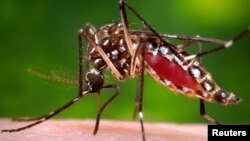A global health expert is sounding the alarm that an epidemic of Zika infections may be headed to western Africa, in countries ravaged over the past two years by Ebola. He says efforts to contain Zika are essential to head off another devastating public health emergency on the continent.
This week, a baby in Cape Verde, a Portuguese-speaking island off the northwestern coast of Africa, was born with the neurological defect microcephaly, a small head due to an undeveloped brain. Tests are still pending to see whether the birth defect was caused by Zika virus, a pathogen carried by mosquitoes.
The disease has infected dozens of pregnant women in South America, mostly in Brazil, who have given birth to babies with microcephaly. The condition causes stillbirth, or if the baby lives, severe neurological complications.
Daniel Lucey, an infectious diseases specialist at Georgetown University in Washington fears the case of microcephaly in Cape Verde could be a sign of things to come in Western Africa.
He is calling for strong and immediate preventive measures.
“If we had the chance to prevent that from happening in West Africa and parts of continental Africa, wouldn’t we want to do it? And now is the time to do it," he said. "Now is the time we have the opportunity to intervene against the Zika virus and subsequent microcephaly epidemics in other parts of West Africa besides Cape Verde.”
Lucey is calling for aggressive genetic testing in cases where Zika is suspected, especially in pregnant women.
He says aggressive, widespread mosquito-control efforts against the Aedes aegypti mosquito that spreads Zika should commence. These include destroying mosquito larvae with insecticides and limiting exposure to bites by encouraging people to stay indoors during the day and wear long-sleeved garments outside.
Lucey is particularly worried about the impact of Zika in Sierra Leone, Guinea and Liberia, countries that were the epicenter of the Ebola epidemic. Thousands died from the highly infectious disease as the developing nations tried desperately to cope with new cases.
The symptoms of Zika, which are relatively mild, could be mistaken for the early signs of Ebola, which Lucey worries could overtax medical resources as health workers tried to determine what disease they were facing.
Lucey sounded the warning in a commentary published in the journal Health Security.
The World Health Organization is considering some dramatic experimental methods of mosquito control. They include releasing sterile mosquitoes into the wild, so the insects can’t reproduce, and setting out swarms of aegypti mosquitoes infected with the bacteria wolbachia.
“The concept, as I understand it," he said, "iis mosquitoes that are infected with the wolbachia bacteria are much less likely to then be infectible with viruses like the Zika virus and, therefore, they are not going to be able to transmit the Zika virus to people, to us, to our species, to human beings.”
Meanwhile, computer modeling conducted by the U.S. National Center for Atmospheric Research concludes that warmer weather conditions in the United States could attract aegypti mosquitoes, possibly bringing the threat of Zika to an estimated 50 U.S. cities.




